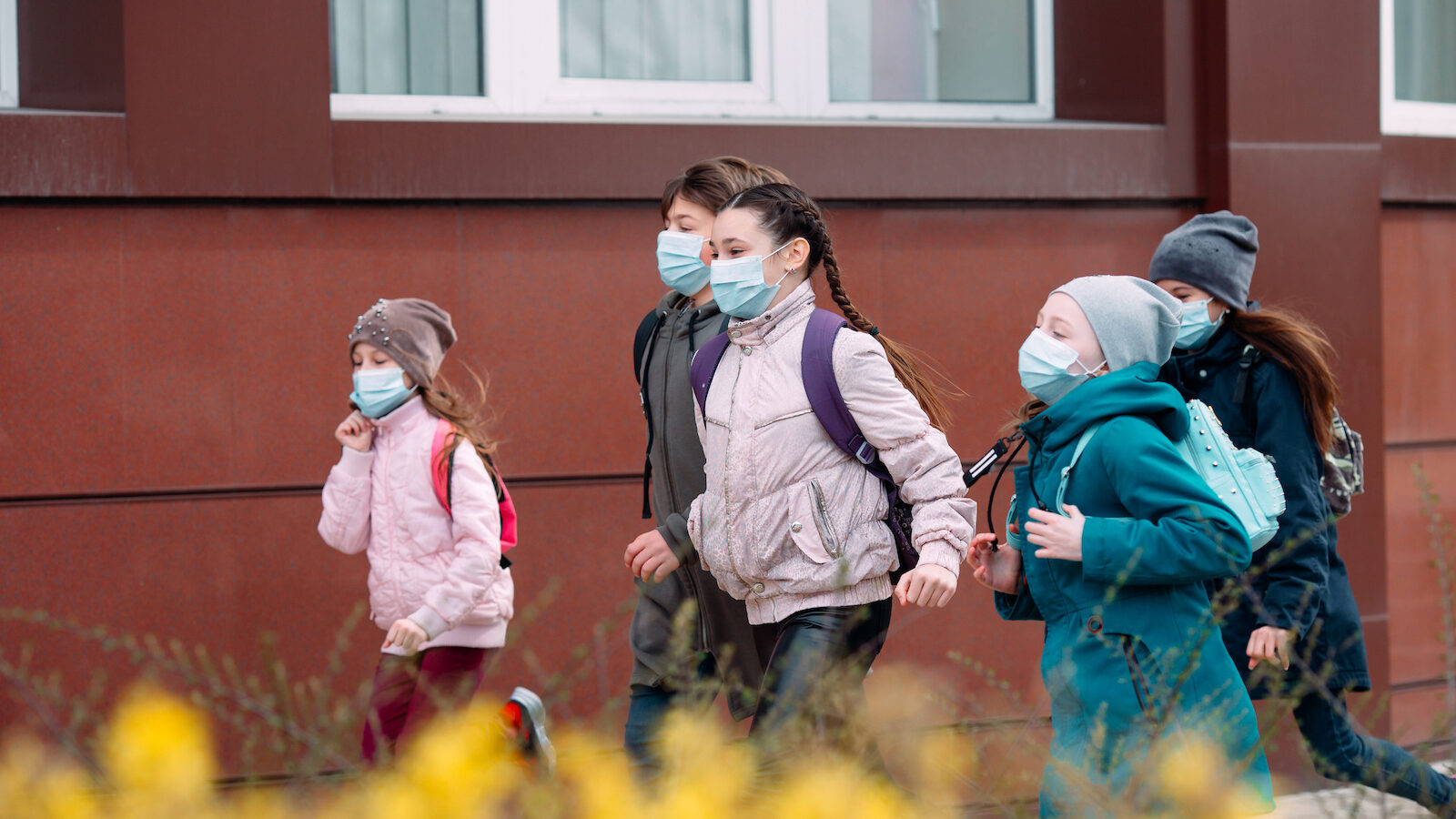Brussels, 20 July 2020
7 lessons learned from COVID-19

Even though the pandemic challenged us in many ways, it also helped us to better understand key aspects of quality education
The COVID-19 pandemic has seriously impacted education systems in Europe. It posed challenges for learners, teachers, school leaders, parents and families, affecting the educational community as a whole. School closures all over the continent and the prolonged confinement of families to their homes have changed the way we work, live and learn together in a profound way. Even though the crisis challenged us in many ways and caused considerable trauma for many learners, it also helped us to better understand key aspects of quality education that should be considered in the future. In this regard, we have identified 7 lessons for policy reform, school governance and teaching that can be learned from the COVID-19 pandemic.
Successful education helps children build meaningful relationships with the world. All children and adolescents need a safe, healthy and engaging learning environment to grow and thrive. Distance learning during the COVID-19 pandemic has once again demonstrated that the physical, emotional and mental well-being of pupils are key prerequisites for personal development and quality education. While opportunities of formal learning can provide a sense of normality in difficult times, it is crucial to avoid too much academic pressure. Stress relief may be achieved by sticking to a daily routine and by encouraging physical and artistic activity. It is also crucial to provide a safe space for learners to speak about and deal with traumatic and life-changing events.
We call on policy-makers to shift the focus of education policies towards prioritizing the well-being of all learners and the development of holistic curricula at school level. Schools should also be enabled to address the trauma caused by the COVID-19 pandemic by offering curative education to all learners in need.
School closings have helped digital learning make an unexpected breakthrough. Its proponents are loudly complaining about a lack of digital readiness in schools and call for investments in digital infrastructure. This one-sided perspective completely ignores the devastating health impacts of screen-time, especially on young children. The COVID-19 pandemic has proven that extensive screen-based teaching cannot ensure sustainable learning in the long run. Steiner Waldorf schools have always insisted on the importance of an age-appropriate and development-oriented media education. While digital technology is undoubtedly helpful for the for some aspects of learning, it cannot replace the most important element of learning: the encounter from person to person and the direct experience of the teachers’ enthusiasm for their work.
We call on policy makers to insist on presence teaching as the regular form of schooling. Distance learning should only be used in exceptional circumstances and as a complementary tool and should take into account the age and individual capacity of the learner as well as the technology available at home. To maintain a meaningful relationship with the world and others, the methods used in such a scenario should limit screen time by alternating academic learning with periods of physical and artistic activity and encourage a vivid exchange between learners.
The COVID-19 pandemic has forced a fast and sudden transition from presence to distance learning. In many ways the crisis has shown that teaching is a highly creative and artistic profession. Many teachers showed a great deal of personal initiative and have developed innovative solutions tailored to the needs of their pupils. This requires a great deal of professionalism that can only be achieved through careful self-reflection and the consciousness for the needs of every child, developed through regular authentic contact with pupils and colleagues. They are best developed in an atmosphere of trust, where teachers experience true ownership of their work and feel supported and empowered by their colleagues.
We therefore call on policy makers to give substantial pedagogical freedom to teachers while encouraging schools to develop adequate support structures such as mentoring schemes, job-shadowing, peer-exchanges and tools of self-reflection. Trusted teachers working together are the basis for schools successfully adapting to change.
During the COVID-19 pandemic, schools suddenly had to rely much more on parents in their key role as primary caretakers of children and adolescents. Suddenly, many parents had to take considerable responsibility in supporting their children’s learning process at home. This has shown again how much both the educational success and healthy development of children and adolescents depend on supportive parents. To ensure that the voice of parents is heard in every school, reliable communication channels between schools and parents must be established. Of course, schools must still offer direct and tailored support to children in need, whenever parents are not responsive or engaged.
In order to be prepared for exceptional situations, to maintain a healthy school climate and to ensure the physical, mental and social-emotional wellbeing of each learner, policy makers should acknowledge the important role of parents in the school community. Education policies should highlight the need for clear and reliable communication channels and facilitate regular and active exchange between schools and parents. Furthermore, schools may consider appointing an ombudsperson for parents.
The COVID-19 pandemic has shown that parental school choice all too often depends on a stable and sufficient income. As the crisis resulted in a significant loss of jobs and income, many families will not be able to pay school fees. This may force them to take their children out of their chosen and familiar school environment. In an already challenging situation, such a profound change puts children under additional stress and their well-being further at risk. Where independent schools receive zero or partial state funding, this puts the existence of independent schools at risk. If they were to close as a result, this would render the system less inclusive and diverse, and parents would be deprived of their fundamental right to choose their preferred pedagogical approach.
We therefore call on policy makers to make a sustainable commitment to preserve educational choice at all times and ensure that all interested families have access to independent education, regardless of their financial means. Under the current conditions, all families in need should also be provided with emergency funding to cover their school fees.
No school should be forced to close its doors as a result of an economic crisis. Financial support to independent schools should therefore be substantially increased in order to sustainably ensure diversity and inclusiveness of educational choice. Already ahead of the COVID-19 pandemic, the European Parliament has adopted a resolution (Article 76) that encourages member states “with regard to increasing inclusiveness and ensuring freedom of educational choice” to provide “adequate financial support for schools of all categories and levels, both state schools and not-for-profit private schools”. And yet, independent schools in many countries still fully or partially rely on parental fees.
We therefore call on governments to provide independent schools with immediate and easy access to emergency funding covering their current losses. More importantly, full public funding should be provided to independent schools at all times to sustainably ensure equality, parental school choice and diversity in education.
The COVID-19 crisis has revealed the immense innovation potential laying bare in many schools. Where schools had the flexibility to act independently, many were able to successfully adapt to the sudden change and provide tailored solutions for the local context. This worked particularly well where governments limited themselves to providing essential infrastructure, training and guidance, as well as networking possibilities and emergency financial support. Competent school leaders and teachers, on the other hand, were best positioned to locally address pedagogical and organisational challenges and make adjustments to the curriculum. In contrast, a highly prescriptive and centralised governmental approach towards crisis management, with little school autonomy, would have been less fruitful (see: OECD 2020).
In order to benefit from the immense innovation potential in schools, we call on policy makers to give substantial autonomy to schools. They should be allowed to develop forms of distributed school leadership, define school based curricula, and give substantial pedagogical freedom to teachers. Authorities should focus on the development of a quality culture in schools by offering schools and teachers support structures and opportunities of organisational and professional development. With more pedagogical freedom and trust in schools comes more opportunity, more diversity and more authenticity — for the benefit of all learners.
- Allianz Eliant. 2020. Was Kinder besonders vermisst haben und dringend brauchen. Available here.
- Bundes der Freien Waldorfschulen. 2020. Gemeinsame Stellungnahme des Bundes der Freien Waldorfschulen und der Medizinischen Sektion am Goetheanum zur Covid-19-Pandemie. Available here.
- Council of Europe. 1950. Convention for the Protection of Human Rights and Fundamental Freedoms. Article 2. Available here.
- Debeljuh, Andrea. 2019. Risks of ICT Usage and NTC Learning System. Available here.
- Diagnose Funk. 2020. Corona und Digitale Bildung: Digitallobby beutet Ängste aus. Available here.
- Diagnose Funk. 2020. Lehren aus Fernunterricht: Unterricht muss menschlich bleiben. Available here.
- European Meeting of Independent Education (EMIE) 2020. Declaration: Europe must not forget Independent Education and Educational Pluralism. Available here.
- European Parliament. 2016. Charter of Fundamental Rights of European Union. Article 14 (3). Available here.
- European Parliament. 2018. European Parliament resolution of 12 June 2018 on modernisation of education in the EU. Article 76. Available here.
- Landl, Richard. 2019. Technology: The change in culture and education. Available here.
- Lifelong Learning Platform. 2020. COVID-19: Mental health and wellbeing of all learners come first. Available here.
- OIDEL. 2016. Freedom of Education Index Worldwide Report 2016 on Freedom of Education. Available here.
- Organisation for Economic Co-operation and Development (OECD). 2020. Schooling disrupted, schooling rethought. How the COVID-19 pandemic is changing education. Available here.
- Osterrieder, Marcus. 2019. From cosmic to artificial intelligence: The struggle for human consciousness. Available here.
- Reubke, Philip. 2019. How to prepare Children for Media Literacy in the Early Years. Available here.
- Unblack the Box. 2020. Digitalisierung von Bildungseinrichtungen: Die alternative Checkliste (Stand: Juni 2020). Available here.
- United Nations (UN). 1966. International Covenant on Economic, Social and Cultural Rights. Article 13 (3). Available here.
- United Nations Educational, Scientific and Cultural Organization (UNESCO). 1960. Convention against Discrimination in Education. Article 4. Available here.
A question? Please don’t hesitate to contact us!

Georg Jürgens
+32 485 66 82 30
georg.juergens@ecswe.eu



